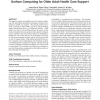Free Online Productivity Tools
i2Speak
i2Symbol
i2OCR
iTex2Img
iWeb2Print
iWeb2Shot
i2Type
iPdf2Split
iPdf2Merge
i2Bopomofo
i2Arabic
i2Style
i2Image
i2PDF
iLatex2Rtf
Sci2ools
CHI
2010
ACM
2010
ACM
Exploring the accessibility and appeal of surface computing for older adult health care support
This paper examines accessibility issues of surface computing with older adults and explores the appeal of surface computing for health care support. We present results from a study involving 20 older adults (age 60 to 88) performing gesture-based interactions on a multitouch surface. Older adults were able to successfully perform all actions on the surface computer, but some gestures that required two fingers (resize) and fine motor movement (rotate) were problematic. Ratings for ease of use and ease of performing each action as well as time required to figure out an action were similar to that of younger adults. Older adults reported that the surface computer was less intimidating, less frustrating, and less overwhelming than a traditional computer. The idea of using a surface computer for health care support was well-received by participants. We conclude with a discussion of design issues involving surface computing for older adults and use of this technology for health care. Au...
| Added | 17 May 2010 |
| Updated | 17 May 2010 |
| Type | Conference |
| Year | 2010 |
| Where | CHI |
| Authors | Anne Marie Piper, Ross Campbell, James D. Hollan |
Comments (0)

